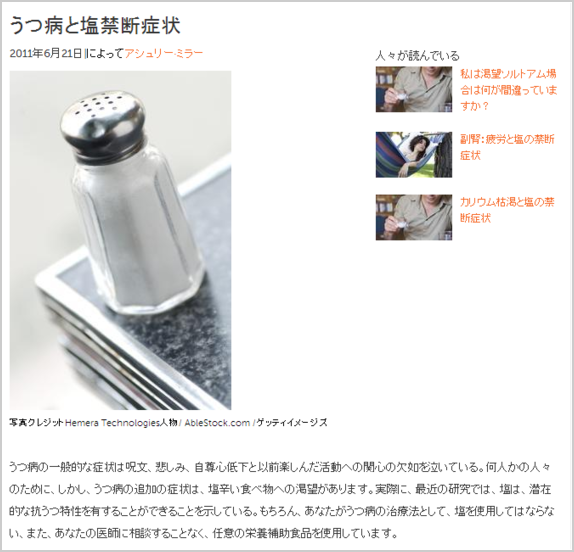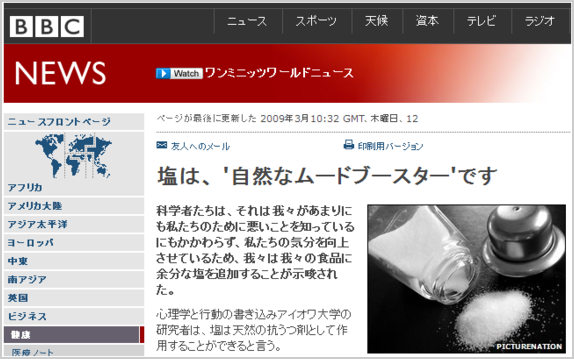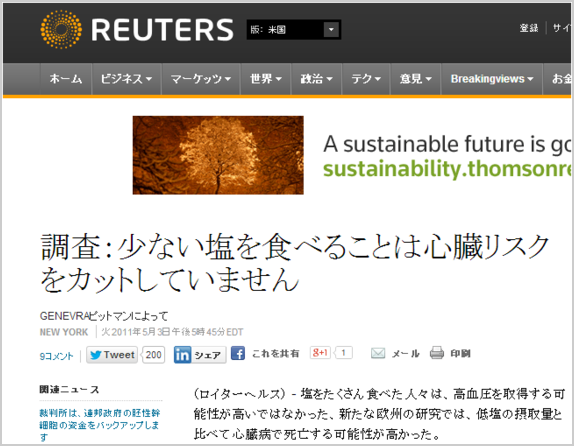Salt and depression
- Salt Deficiency 塩欠乏は病気の原因
- ほとんどの前立腺癌治療は不要と有害
- 鉄分の危険性
- うつ病と栄養
- 脳の栄養
うつ病と塩
うつ病と塩禁断症状 / Depression and Salt Cravings

Copyright © 2013 Demand Media
うつ病の一般的な症状は、悲しみを呪文を泣いている、自尊心と以前楽しんだ活動への関心の欠如を減少させた。何人かの人々のために、しかし、うつ病の追加の症状は、塩辛い食べ物への渇望があります。実際に、最近の研究では、塩は、潜在的な抗うつ特性を有することができることを示している。もちろん、あなたがうつ病の治療法として、塩を使用してはならない、また、あなたの医師に相談することなく、任意の栄養補助食品を使用しています。
Common symptoms of depression are crying spells, sadness, reduced self-esteem and a lack of interest in previously-enjoyed activities. For some people, however, an additional symptom of depression may be a craving for salty foods. In fact, recent research has shown that salt may have potential antidepressant properties. Of course, you shouldn't use salt as a cure for depression, nor use any dietary supplements without consulting your doctor.
うつ病について / About Depression
悲しみ、tearfulness、過敏は、気分を下げた性欲の低下、無気力、疲労だけで臨床的うつ病の一般的な症状のいくつかである。うつ病は世界中で121万人の人々に影響を与え、世界保健機関(WHO)は述べています。これは、製薬会社が次の、最高の抗うつ薬を思い付くしようとして忙しくしていることも不思議ではありません。
Sadness, tearfulness, irritability, lowered mood, decreased sex drive, lethargy and fatigue are just some of the common symptoms of clinical depression. Depression affects around 121 million people worldwide, says the World Health Organization. It's no wonder that pharmaceutical companies are busy trying to come up with the next, best antidepressant medication.
しかし、抗うつ薬は、多くの人々のために不要な、不快な副作用のホストを引き起こす可能性があります。抗うつ薬は、うつ病の症状を管理するのに役立つことができますが、それは治療ではありません。根本的な問題は、薬なしで改善する抑うつ症状のための順序で対処しなければならない。研究者は、おそらく、例えばナトリウムなどの欠如、脳および栄養障害、の化学不均衡として抑うつ障害の形成に寄与し得る重要な多くの要因を検討した。
However, antidepressants can cause a host of unwanted, unpleasant side effects for many people. Although antidepressants can help manage symptoms of depression, it's not a cure. Underlying issues must be addressed in order for depressive symptoms to improve without medication. Researchers have examined a number of important factors that may possibly contribute to the formation of depressive disorders, such as chemical imbalances in the brain and nutritional deficits, such as a lack of sodium.
塩とうつ病/ Salt and Depression
あなたの食事療法でも多くの塩が発生する可能性がありながら、このような高血圧や心臓病、ナトリウムの不足などの健康上の問題だけでなく、物理的および精神的な問題に貢献することができます。全体の保健センターによると、物理的および精神障害の様々な自然と代替治療に焦点を当てた医療行為は、低カリウム/ナトリウムの比は不満、疲労、敵意と恨みの低血糖、うつ病や感情に関連付けられています。
While too much salt in your diet can cause health problems such as high blood pressure and heart disease, a lack of sodium can contribute to physical and mental problems as well. According to the Whole Health Center, a medical practice focusing on natural and alternative treatments to a variety of physical and mental disorders, a low potassium/sodium ratio is associated with low blood sugar levels, depression and feelings of frustration, fatigue, hostility and resentment.
カリウムは体内の塩分濃度のバランスをとるのに役立つミネラルです。あなたは塩の禁断症状と組み合わせるうつ症状が発生した場合、それはナトリウムのあなたの食事摂取量が低すぎるというサインかもしれません。
Potassium is the mineral that helps to balance salt levels in your body. If you experience depressive symptoms combined with salt cravings, it may be a sign that your dietary intake of sodium is too low.
臨床的証拠/ Clinical Evidence
研究者ミカLeshemの調査によると、高食塩摂取量は、逆境やストレスに対処する適応的な方法を提供することがあります。ジャーナルの2011年7月号に掲載された彼の研究は、 "生理学&行動、 "その低ナトリウム摂取量は行動テスト、2つの異なるタイプを受ける実験用ラットの行動のような不安を増加させることが判明したが見つかりました。
According to a study by researcher Micah Leshem, high dietary salt intakes may provide an adaptive way of coping with adversity and stress. His study, published in the July 2011 issue of the journal, "Physiology & Behavior," found that low sodium intake was found to increase anxiety-like behaviors in laboratory rats subjected to two different types of behavioral tests.
"生理学&行動"の2008年7月号に掲載されたアイオワ州の心理学者アラン·キム·ジョンソンと仲間の研究者、大学の別の研究では、塩化ナトリウム欠損実験用ラット、またはテーブル塩は、このような押したときと、彼らは通常、楽しむ活動を避ける傾向にあることが示された喜びの自分の脳内センターや甘い液体を飲んを刺激するバー。
Another study by University of Iowa psychologist Alan Kim Johnson and fellow researchers, published in the July 2008 issue of "Physiology & Behavior" showed that laboratory rats deficient in sodium chloride, or table salt, tend to avoid activities they usually enjoy, such as pressing a bar that stimulates the pleasure centers in their brains and drinking sugary fluids.
研究では、低栄養塩の摂取量が一定の抑うつ症状の潜在的な原因である、と塩のために増加した欲求は、その可能性気分昇降特性によって説明されるかもしれないことも示唆している。これらの研究は有望な結果を示しているが、多くの臨床研究は、完全にうつ病に低い食塩濃度の影響を評価するために必要とされる。''''
The study suggests that low dietary salt intake may be a potential cause of certain depressive symptoms, and that increased cravings for salt may be explained by its possible mood-elevating properties. While these studies show promising results, more clinical research is needed to fully evaluate the impact of low dietary salt levels on depression.
考慮事項/ Considerations
塩の禁断症状は、うつ病に関連しているかもしれません。しかし、にしようとしない、自己診断して発生している可能性があり、任意の物理的または精神的な問題を扱うか。適切に治療しなければ、うつ病は悪化することができます。さらに、特定の医療の病気は、抑うつ症状を引き起こす可能性があります。診断を得て、治療の選択肢を議論する資格のある医療専門家にご相談ください。従来の治療の代替として塩を使用しないでください。
Salt cravings may be associated with depression. However, do not attempt to self-diagnose or treat any physical or mental problems you may be experiencing. Depression can become worse if not properly treated. Additionally, certain medical illnesses can cause depressive symptoms. Consult a qualified medical professional to obtain a diagnosis and to discuss treatment options. Do not use salt as a replacement for conventional medical treatment.
http://www.livestrong.com/article/476382-depression-and-salt-cravings/
塩は、'自然なムードブースター'です
Salt is 'natural mood-booster'

BBC © 2013 The BBC
科学者たちは、それは我々があまりにも私たちのために悪いことを知っているにもかかわらず、私たちの気分を向上させているため、我々は我々の食品に余分な塩を追加することが示唆された。
Scientists suggest we may add extra salt to our food because it boosts our mood, even though we know too much is bad for us.
うつ病のサイン - 心理と行動の書き込みアイオワ大学の研究者は、塩はラットの自然antidepressant.Tests彼らが正常に楽しんで活動から敬遠塩欠乏を持つものを見つけたとして作用することができると言う。
University of Iowa researchers writing in Psychology and Behavior say salt may act as a natural antidepressant.Tests on rats found those with a salt deficiency shied away from activities they normally enjoyed - a sign of depression.
しかし、専門家はあまり塩を食べて警告するが高血圧にリンクされています。ボディは、ナトリウムが必要 - 関数に、あまりにも多くの募金と血圧を有する脳卒中や心臓発作のリスク増加にリンクされている - これは、一緒に塩化物と塩を構成する。英国の食品基準庁は、平均的な成人はもう塩の日の6グラム以上を食べるべきではないと言います。
But experts warn eating too much salt is linked to high blood pressure.The body needs sodium - which along with chloride makes up salt - to function, but having too much and raising blood pressure is linked to an increased risk of stroke and heart attack.The UK's Food Standards Agency says the average adult should eat no more than 6g of salt a day.
摂取量は低下しているが、昨年の平均は8.6グラムであった。私たちが食べる塩の周りに四分の三は、事前に準備foods.The所見で来るFSAは人々がより健康に食べるためにそのアドバイスをリニューアルとして公開されています。
Intake is falling, but last year the average was 8.6g. Around three-quarters of the salt we eat comes in pre-prepared foods.The findings are published as the FSA renewed its advice for people to eat more healthily.
これは、有名シェフが高脂肪のレシピを促進し、肥満の危機に貢献したことを警告する専門家の独立したパネルを支持した。
It backed an independent panel of experts warning that celebrity chefs were promoting high-fat recipes, and contributing to the obesity crisis.
禁断症状/ Cravings
米国の研究者によって実施した試験では、ラットが塩で欠乏だったとき、彼らは離れて、彼らは通常、甘い物質を飲んだり、自分の脳に快感を刺激するバーを押すように、楽しむ活動から敬遠ことがわかった。
The tests carried out by US researchers found that when rats were deficient in salt, they shy away from activities they normally enjoy, like drinking a sugary substance or pressing a bar that stimulates a pleasant sensation in their brains.
研究を主導した心理学者のキム·ジョンソンは、言った: "正常ラットで楽しいだろう事は、私たちはそれに関連付けられた塩赤字と渇望は次のいずれかを誘導することができると信じているにつながる風味同程度の、惹起しなかったキーの症状はうつ病に関連付けられている。 "
Psychologist Kim Johnson, who led the research, said: "Things that normally would be pleasurable for rats didn't elicit the same degree of relish, which leads us to believe that a salt deficit and the craving associated with it can induce one of the key symptoms associated with depression."
一部の人々はまだあまりにも多くの塩を食べてなぜこの研究は、彼らはそれが塩と健康に関する行動のコンセンサス彼らのために悪いことを知っているにもかかわらず、私たちが理解するのに役立つかもしれ、彼女はそれが普通に楽しい活動に喜びの喪失は、心理的な不況の中で最も重要な機能の一つであると述べた。
This research may help us to understand why some people still eat too much salt, even though they know it's bad for them Consensus for Action on Salt and Health,She said it a loss of pleasure in normally pleasing activities is one of the most important features of psychological depression.
そして、彼女は看板塩は中毒性があるかもしれませんと言いました。中毒の一つの符号は、それが有害であることが知られていても物質を使用している - そして、人々は彼らの塩分摂取量をカットする必要があります知っているにもかかわらず、彼らは味が好きで、低塩食品は当たり障りのない見つけるためのit.Another強い側面を食べ続ける何かが源泉徴収されている場合は、中毒禁断症状の開発である。
And she said there were signs salt could be addictive.One sign of addiction is using a substance even when it is known to be harmful - and even though people know they should cut their salt intake, they like the taste and find low-salt foods bland so continue to eat it.Another strong aspect of addiction is the development of cravings if something is withheld.
アイオワ大学のチームは、ラットは薬や塩不足にさらされているかどうか、彼らが行った試験では脳の活動で同様の変化を示したと言う。"これは、その塩のニーズや欲求を薬物中毒や虐待に関連したものと同じ脳の経路にリンクすることを示唆している。 "
'もっと憂鬱'
The University of Iowa team say tests they carried out showed similar changes in brain activity whether rats are exposed to drugs or salt deficiency."This suggests that salt need and cravings may be linked to the same brain pathways as those related to drug addiction and abuse."'More depressing'
しかし交じりすぎ塩を食べることの健康上のリスクについての意識を高めるためのキャンペーンヘルス( CASH ) 、上のコンセンサスアクションのスポークスマンは、言った: "私たちの体は非常に小さい関数に塩の量が、その量のように何も必要私たちのほとんどは食べる。
But a spokesman for Consensus Action on Salt and Health (CASH), which campaigns to raise awareness about the health risks of eating too much salt, said: "Our bodies need a very small amount of salt to function, but nothing like the quantities that most of us eat.
"この研究では、彼らはそれが彼らのために悪いことを知っているにもかかわらず、一部の人々はまだあまりにも多くの塩を食べる理由を私たちが理解するのに役立つ可能性があります。 "私は個人的にあまりにも多くの塩を食べていないことで落ち込んで感じたことはなかった:私はそれを持ってはるかに気のめいることだと思うそんなに塩を食べていないことによって回避された可能性があります"心臓発作や脳卒中。
"This research may help us to understand why some people still eat too much salt, even though they know it's bad for them."I personally have never felt depressed by not eating too much salt: I think it would be far more depressing to have a heart attack or stroke that could have been avoided by not eating so much salt."
http://news.bbc.co.uk/2/hi/health/7938932.stm
塩と高血圧は関係しない
High blood pressure and salt is not related
研究は、関連しない食塩摂取量と高血圧を言う
Study says salt intake and high blood pressure not related

By Anissa FordG+ 2011-05-05 12:03
ヨーロッパの研究者は、低塩の摂取量を持つ人々がより高い塩摂取量を持つ人よりも心臓病で死亡する可能性が高いことがわかった。しかし、ハーバード大学の栄養学の専門家は調査が完了したナンセンスであると言う。
European researchers found that people with low salt intakes were more likely to die of heart disease than people with higher salt intakes. But Harvard nutrition experts say the study is complete hogwash.
研究では、 8年間で様々なヨーロッパの国に住む3,681人を調査した。その8年の期間の終わりには、低ナトリウム摂取量との参加者の56%が高塩分摂取と比べて心血管疾患で死亡した可能性が高かった。研究では、何が政府の医療専門家は、アメリカ人が高血圧と心血管疾患のリスクを軽減するためのクエストで自分の塩分摂取量を減少させると主張するように促す米国の福音の真理となっているアメリカの医学協会の反論の昨日のジャーナルで発表した。
The study surveyed 3,681 people living in various European countries over an eight year period . At the end of that eight year period, 56% of participants with low sodium intakes were more likely to have died from cardiovascular illness than those with high salt intakes. The study published in yesterday's Journal of the American Medical Association refutes what has become a gospel truth in the US prompting government health experts to insist Americans decrease their salt intake in the quest to reduce hypertension and cardiovascular disease risks.
ヨーロッパの研究は、長年にわたって続いて3,681人の研究の開始時に正常血圧とのそれらの参加者2,100 、それらの塩の摂取量は、高血圧の開発に影響を与えなかったことがわかった。研究では、最初に、米国政府の健康とアメリカ人が心血管疾患を防ぐために、彼らの塩分摂取量を減らすことがダイエット勧告と矛盾するように見える。
The European study found that of the 3,681 people followed over the years, 2,100 of those participants with normal blood pressure at the start of the study, their salt intake had no effect on the development of high blood pressure. The study, on the outset, appears to contradict the US government health and diet recommendation that Americans reduce their salt intake to prevent cardiovascular disease.
ハーバード栄養士は、高い塩摂取、高血圧、心血管疾患のリスクを相関研究の25年間に反するため、研究は無視されるべきであると言う。
Harvard nutritionists say the study should be ignored because it contradicts 25 years of research that correlates high salt intake, high blood pressure and the risk of cardiovascular disease.
アメリカの研究者は、イタリア、ブルガリア、ベルギーに位置し、近隣には4,000人の研究を感じ、ロシアとルーマニアはずっと徹底や正確なので、無効から、誤解を招くおそれがあります。ヨーロッパの研究では、 8年間の調査の終了時に1回、ナトリウムの排泄を調査した。
American researchers feel the study of close to 4,000 people in Italy, Bulgaria, Belgium, Russia and Romania is misleading, far from thorough or accurate and therefore invalid. The European study surveyed the excretion of sodium once at the end of an eight year survey.
ハーバード大学は人のナトリウム排泄の測定は人のナトリウム摂取量の正確な測定とみなされている場合でも1ナトリウム排泄サンプルは8年間で、人の塩分摂取量の公正な調査ではないことを述べています。研究では、参加者の中で最も古い年代、ハーバードの科学者は結論を形成するか、または米国で高血圧症の患者との比較をすることが若すぎると考えてい8年の期間の終了時に49だった
Harvard says that one sodium excretion sample isn't a fair survey of a person's salt intake over an eight year period even if the measurement of a person's sodium excretion is considered an accurate measure of the person's sodium intake. The oldest ages of the participants in the study were 49 at the end of the eight year period which Harvard scientists believe is too young to form conclusions or make comparisons with hypertension sufferers in the U.S.
アメリカ人のナトリウム摂取量の75%が加工食品から来ていると高い割合に応じて、医学研究所は、加工食品で許可され、塩とナトリウムの量を調節するために米国食品医薬品局(FDA)に呼びかけている。
75% of Americans' sodium intake comes from processed foods and in response to the high percentage, the Institute of Medicine has called on the US Food and Drug Administration to regulate the amount of salt and sodium allowed in processed foods.
WASH (ソルト健康に関する世界行動)は、高塩分摂取に高血圧を結ぶ証拠が証拠と同じくらい強いと述べている喫煙へのリンクは肺がん。遺伝、疫学、死亡率、人口、移住、介入、および高塩分摂取と高血圧の間のリンクを証明するために行った処置:多くの研究がなされている。
WASH (World Action on Salt Health) states that evidence connecting high blood pressure to high salt intake is as strong as the evidence that links lung cancer to cigarette smoking. There have been a number of studies: genetic, epidemiological, mortality, population, migration, intervention, and treatment conducted to prove the link between high salt intake and hypertension.
研究と統計は、アメリカ人の90%が自分たちの生活で高血圧を開発することを示唆している。 1950年に日本で実施され、人口研究は高い塩の消費量と脳卒中による死亡は、特に北部、日本で、世界で最も高い水準であることがわかった。
Studies and statistics suggest that 90 percent of Americans will develop high blood pressure in their lives. Population studies conducted in Japan in the 1950s found that high salt consumption and deaths from stroke were among the highest in the world, particularly in north Japan.
日本政府は、小児の高血圧のレベルを減少させるだけでなく、脳卒中死亡率の80%減少をもたらす助け塩分の摂取量を減らすために成功した健康キャンペーンを開始した。同時に、喫煙の巨大な減少、過剰な体重増加、およびアルコール消費があった。
The Japanese government initiated a successful health campaign to reduce salt intake which helped decrease the levels of high blood pressure in children as well as bring about an 80 percent reduction in stroke mortality. At the same time, there was a huge reduction of cigarette smoking, excessive weight gain, and alcohol consumption.
同様の研究はまた、健康で長生き人口をもたらし北カレリア、フィンランドで行われた。
Similar studies were conducted in North Karelia, Finland which also resulted in a healthier and longer lived population.
ハーバード健康作家が食事に高血圧スティックの可能性を追い払うためにしたい人は、運動と体重を減らすための取り組みを行うことを示唆している。それらは、心血管疾患のリスクと高血圧症の予防のための保証3心臓の健康のヒントです。ハーバード大学の研究者がヨーロッパの食事や測定や米国の食とヨーロッパの食生活の比較における加工食品に対する準備生の食品を指していませんでした。
Harvard Health writers suggest that those who want to ward off the possibility of hypertension stick to diet, exercise and make the commitment to lose weight. Those are the guaranteed three heart health tips for prevention of cardiovascular disease risk and hypertension. Harvard researchers did not point to European diets or prepared raw foods versus processed foods in measurements or comparisons of US diets and European diets.
ヨーロッパの研究は、欧州食品と準備がアメリカよりも健康であることを証明するために行われた場合、確かに、ハーバード大学は、おそらくポイントはよく取られると主張するが、長いファーストフード、クイックフィックスと電子レンジで食事を燃料と社会の中で議論の余地があろう。
Certainly, if the European study was conducted to prove that European food and preparation is healthier than American, Harvard would likely argue the point is well taken, but moot in a society long fueled by fast food, quick fixes and microwaved meals.
さらに、健康的な食生活、食品および飲料の選択肢と要件を擁護米国の努力は、多くの場合、激しい抵抗に会ったと憤慨している。多くは、アメリカの食生活を規制や健康的な食事を促進するため、コールが個人のプライバシーと個人の自由の失効に関する政府侵入だと思っています。
Furthermore, US efforts championing healthier diet, food and beverage choices and requirements are often met with fierce resistance and resented. Many feel the call to regulate American diets or encourage healthy eating is government intrusion on personal privacy and a lapse in personal freedoms.
しかし、少数の健康のための権利擁護団体は、多くの場合、新鮮な果物や野菜の不足を指摘しているのに対し、都市部とアフリカ系アメリカ人の大きなポケットが住んで食料品店で利用可能な加工食品の豊富さは、そのうちの多くは高血圧、過度の体重の影響を受けている、糖尿病や心臓疾患。
Yet, advocacy groups for minority health have often pointed to the lack of fresh fruit and vegetables, versus the abundance of available processed foods in urban areas and grocery stores where large pockets of African Americans live, many of whom are affected by hypertension, excessive weight, diabetes and heart disease.
http://www.huliq.com/10178/study-says-salt-intake-and-high-blood-pressure-not-related
調査:少ない塩を食べることは心臓リスクをカットしていません
Eating less salt doesn't cut heart risks: study

Reuters.com
(ロイターヘルス) - 塩をたくさん食べた人々は、高血圧を取得する可能性が高いではなかった、新たな欧州の研究では低塩の摂取量を持つものよりも心臓病で死亡する可能性が高かった。
(Reuters Health) - People who ate lots of salt were not more likely to get high blood pressure, and were less likely to die of heart disease than those with a low salt intake, in a new European study.
調査結果は、 "確かに、一般集団より低い塩分の摂取量に現在の勧告をサポートしていない、 "ベルギーのルーベン大学の調査の著者の先生ヤンStaessenは、ロイターヘルスに語った。
The findings "certainly do not support the current recommendation to lower salt intake in the general population," study author Dr. Jan Staessen, of the University of Leuven in Belgium, told Reuters Health.
月に米国政府が発表したものを含め、現在の塩のガイドラインは、低塩濃度または高塩食に割り当てられるようにボランティアの人々の短期的な研究からのデータに基づいており、 Staessenは言った。
Current salt guidelines, including those released by the U.S. government in January, are based on data from short-term studies of people who volunteered to be assigned to a low-salt or high-salt diet, Staessen said.
米国のガイドラインでは、そのアメリカ人は塩の日常未満の2,300ミリグラムを消費をお勧め - 高血圧や心臓病のリスクがよりある特定の人々に1,500ミリグラム。
The U.S. guidelines recommend that Americans consume less than 2,300 milligrams of salt daily - 1,500 mg in certain people who are more at risk for high blood pressure or heart disease.
以前の試験では、低塩分の摂取量と血圧の利益を示唆しているが、研究では、より全体的な心臓の健康にその変換するかどうかより広い集団で見せるには至っていない。
While previous trials suggested a blood pressure benefit with lower salt intake, research has yet to show whether that translates into better overall heart health in the wider population.
研究者は、研究の開始時に尿サンプルを通して測定彼らの塩消費量を持っていた約3,700ヨーロッパの合計を取り入れ、二つの異なる研究からのデータを使用していました。 Staessenと彼の同僚は、三つのグループに参加者を解散:最高と最低の塩分摂取量を持つものと、平均摂取量を持つもの。
The researchers used data from two different studies, incorporating a total of about 3,700 Europeans who had their salt consumption measured through urine samples at the start of the studies. Staessen and his colleagues broke the participants up into three groups: those with highest and lowest salt intakes, and those with average intake.
参加者のいずれも、冒頭で心臓病を有しておらず、三分の二は、正常血圧を有していた。これらは、研究者は、心臓病にどのようにそれらの多くは診断され、そしてより小さいグループで、高い血圧をどれだけ持って決定される間、 8年の平均追跡した。
None of the participants had heart disease at the outset, and two thirds had normal blood pressure. They were followed for an average of 8 years, during which researchers determined how many of them were diagnosed with heart disease, and in a smaller group, how many got high blood pressure.
調査結果は、米国医師会( JAMA )誌に掲載されています。
The findings are published in the Journal of the American Medical Association (JAMA).
心臓や血管の病気を得ることのチャンスには、3つのグループに差は認められなかった。しかし、最低の塩分摂取量を持つ参加者は、 ( 4% )のフォローアップ時に心臓病による死亡の最高速度を持っていたし、ほとんどの塩を食べた人々は、 ( 1%未満)最下位を持っていた。
The chance of getting heart and blood vessel diseases did not differ in the three groups. However, participants with the lowest salt intake had the highest rate of death from heart disease during the follow up (4 percent), and people who ate the most salt had the lowest (less than 1 percent).
すべての3つの塩摂取グループにわたって、正常血圧で始まった4研究参加者で約1は、フォローアップ時に高血圧と診断された。
Across all three salt-intake groups, about one in four study participants who started out with normal blood pressure were diagnosed with high blood pressure during follow up.
研究者は血圧のつのメジャー、収縮期血圧は、時間の経過とともに増加して塩分摂取量として増加したことを発見した - しかし、変化は非常に小さかったので、健康上の成果に重要ではないかもしれないが、 Staessenは言った。
The researchers did find that one measure of blood pressure, systolic blood pressure, increased as salt intake increased over time - but the change was very small, so it may not be important to health outcomes, Staessen said.
塩を減らすことは依然としてすでに高血圧や過去に心臓の問題を抱えている人は、彼が追加されたを持っている人のための良いアイデアであるが、研究では、栄養塩がこれらの条件が発生する原因となるという証拠を発見したかもしれません。
Reducing salt may still be a good idea for people who already have high blood pressure or who have had heart problems in the past, he added, but the study found no evidence that dietary salt causes those conditions to arise.
"それは1つが広く人口のナトリウム摂取量の一般的な削減を提唱し、非常に注意しなければならないことは明らかだ"とStaessenは言った。 "いくつかの利点があるかもしれませんが、また、いくつかの副作用があるかもしれない。 "
"It's clear that one should be very careful in advocating generalized reduction in sodium intake in the population at large," Staessen said. "There might be some benefits, but there might also be some adverse effects."
博士ヒレルコーエン、ニューヨークの医学のアルバートアインシュタイン大学の疫学者は、レストランや食品会社が自社製品ではあまり塩を入れたときに、彼らは失われた味を補うために他の潜在的に有害な製品に置くことがロイターヘルスに語ったまたは防腐剤として。
Dr. Hillel Cohen, an epidemiologist at the Albert Einstein College of Medicine in New York, told Reuters Health that when restaurants or food companies put less salt in their products, they may put in other potentially harmful products to make up for the lost taste, or as preservatives.
消費者は、ナトリウムと心臓リスクの間のリンクを決定しようとしています限られた研究に基づいてそれらの塩を食べる動作を変更するべきではありません、現在の研究に関与していなかったコーエンは、追加された。
Consumers shouldn't change their salt-eating behavior based on the limited studies that have tried to determine the link between sodium and heart risks, added Cohen, who was not involved in the current research.
著者は、彼らの分析は白のみヨーロッパが含まれていること注意、などの結果は、他の民族の人々に変換されないことがあります。
The authors caution that their analysis included only white Europeans, and so the results may not translate to people of other ethnicities.
SOURCE : bit.ly / hwxtTL JAMA 、オンラインで2011年5月3日。
SOURCE: bit.ly/hwxtTL JAMA, online May 3, 2011.